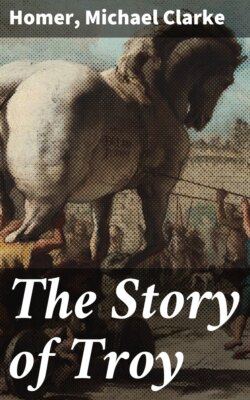Читать книгу The Story of Troy - Michael Clarke - Страница 8
На сайте Литреса книга снята с продажи.
II. THE JUDGMENT OF PARIS.
ОглавлениеTable of Contents
It was through a quarrel among the three goddesses, Juno, Venus, and Minerva, that Œnone, the fair nymph of Mount Ida, met her sad fate, and that the destruction of Troy was brought about. The strife arose on the occasion of the marriage of Peʹleus and Theʹtis. Peleus was a king of Thesʹsa-ly, in Greece, and one of the great heroes of those days. Thetis was a daughter of the sea god Neʹre-us, who had fifty daughters, all beautiful sea nymphs, called "Ne-reʹi-des," from the name of their father. Their duty was to attend upon the greater sea gods, and especially to obey the orders of Neptune.
Thetis was so beautiful that Jupiter himself wished to marry her, but the Fates told him she was destined to have a son who would be greater than his father. The king of heaven having no desire that a son of his should be greater than himself, gave up the idea of wedding the fair nymph of the sea, and consented that she should be the wife of Peleus, who had long loved and wooed her. But Thetis, being a goddess, was unwilling to marry a mortal man. However, she at last consented, and all the gods and goddesses, with one exception, were present at the marriage feast.
For in the elder time, when truth and worth
Were still revered and cherished here on earth,
The tenants of the skies would oft descend
To heroes' spotless homes, as friend to friend;
There meet them face to face, and freely share
In all that stirred the hearts of mortals there.
Catullus (Martin's tr.).
The one exception was Eʹris, or Dis-corʹdi-a, the goddess of discord. This evil-minded deity had at one time been a resident of Olympus, but she caused so much dissension and quarreling there that Jupiter banished her forever from the heavenly mansions. The presence of such a being as a guest on so happy an occasion was not very desirable, and therefore no invitation was sent to her.
Thus slighted, the goddess of discord resolved to have revenge by doing all that she could to disturb the peace and harmony of the marriage feast. With this evil purpose she suddenly appeared in the midst of the company, and threw on the table a beautiful golden apple, on which were inscribed the words, "Let it be given to the fairest."
"This was cast upon the board,
When all the full-faced presence of the gods
Ranged in the halls of Peleus; whereupon
Rose feud, with question unto whom 'twere due."
Tennyson, Œnone.
At once all the goddesses began to claim the glittering prize of beauty. Each contended that she was the "fairest," and therefore should have the
"fruit of pure Hesperian gold
That smelt ambrosially."
But soon the only competitors were Juno, Venus, and Minerva, the other goddesses having withdrawn their claims. The contest then became more bitter, and at last Jupiter was called upon to act as judge in the dispute. This delicate task the king of heaven declined to undertake. He knew that whatever way he might decide, he would be sure to offend two of the three goddesses, and thereby destroy the peace of his own household. It was necessary, however, that an umpire should be chosen to put an end to the strife, and doubtless it was the decree of the Fates that the lot should fall on the handsome young shepherd of Mount Ida. His wisdom and prudence were well known to the gods, and all seemed to agree that he was a fit person to decide so great a contest.
Paris was therefore appointed umpire. By Jupiter's command the golden apple was sent to him, to be given to that one of the three goddesses whom he should judge to be the most beautiful. The goddesses themselves were directed to appear before him on Mount Ida, so that, beholding their charms, he might be able to give a just decision. The English poet, Tennyson, in his poem "Œnone," gives a fine description of the three contending deities standing in the presence of the Trojan prince, each in her turn trying, by promise of great reward, to persuade him to declare in her favor. Juno spoke first, and she offered to bestow kingly power and immense wealth upon Paris, if he would award the prize to her.
"She to Paris made
Proffer of royal power, ample rule
Unquestion'd … . … .
'Honor,' she said, 'and homage, tax and toll,
From many an inland town and haven large.'"
Minerva next addressed the judge, and she promised him great wisdom and knowledge, as well as success in war, if he would give the apple to her.
Then Venus approached the young prince, who all the while held the golden prize in his hand. She had but few words to say, for she was confident in the power of her beauty and the tempting bribe she was about to offer.
